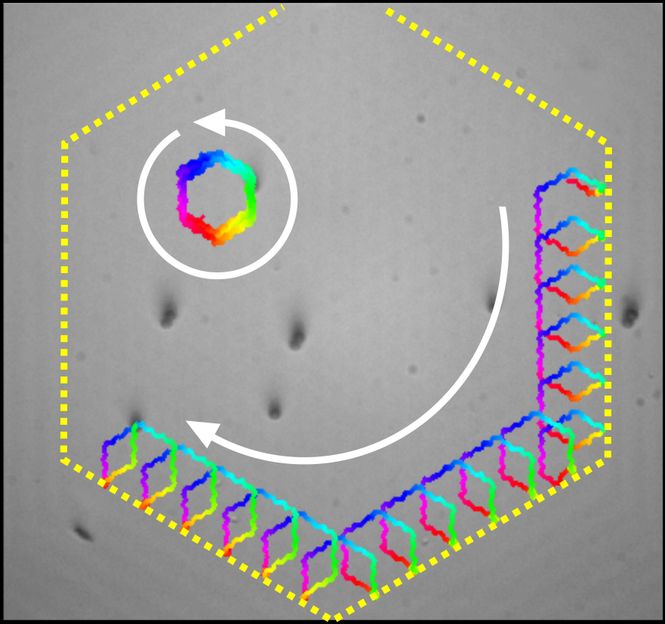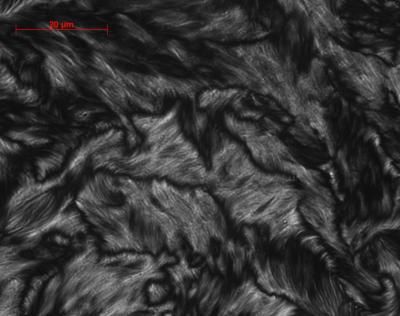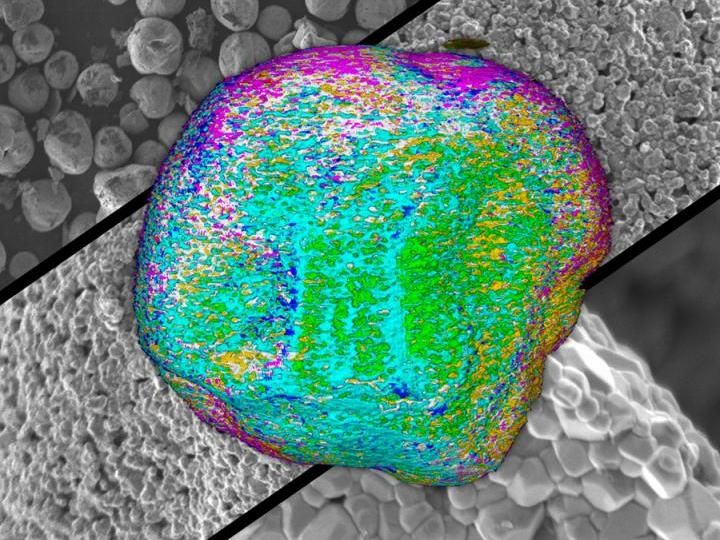Precisely controlling plastic particles
Physicists find unusual colloids
Physicists at the University of Bayreuth have discovered plastic particles that enable the movements of individual particles to be observed without interruption and to be precisely controlled. New microchips which are only a few tenths of a millimetre in size and which are capable of providing such control are thus no longer the stuff of science fiction. These plastic particles are colloids. In the interior of a complex magnetically structured material, they barely change their position at all, however at the edge of the material they move quite rapidly.

The plastic particles move forward in a looping pattern at the edge of the material; in the interior, they only move in closed orbits and barely change their position.
Lehrstuhl für Experimentalphysik V, Universität Bayreuth
Following in the footsteps of Nobel laureates
The colloids thus behave similarly to the electrons of topological insulators, a material class that has fascinated physicists for the past couple of years. Topological insulators are characterized by their ability to conduct electrical current at the material periphery but prevent electrical current from entering their interior. It was British physicists David Thouless, Duncan Haldane, and Michael Kosterlitz who received the Nobel Prize in Physics in 2016 for the important contributions they made to the investigation of such solids by way of their theoretical calculations. Since then, there has been increased interest in large particles which have properties similar to those of the much smaller electrons in topological insulators and which are analogous to them.
The Bayreuth physicists have now succeeded in identifying such particles for the first time. They are colloids which keep their position when placed in the interior of a complex material. However, they are able to crawl along the edge of this material, where they move forward in a looping pattern. To date, no other particles are known to be similar to the electrons of topological insulators in this way.
Future chips as miniature laboratories
The unusual behaviour of these colloids in and on a complex material is due to the structured magnetic field to which they are exposed. As a result of this magnetic field, not only can the movement of the colloids be observed without interruption, they can also be precisely controlled.
In exactly this context, there is promising potential for future applications in research and development: “Individual molecules can be placed on the colloids, for example in the scope of biomedical examinations, and these individual molecules can be precisely transported from one position to a different target by “piggybaciking”. The colloids are thus well-suited for producing microchips on which these processes can be precisely controlled and observed. These chips would then be miniature laboratories for a diverse range of experiments that rely on this type of precise control,” explained Dr. Daniel de las Heras, who is carrying out the research in Bayreuth together with Dr. Johannes Löhr.
Original publication
Other news from the department science

Get the chemical industry in your inbox
By submitting this form you agree that LUMITOS AG will send you the newsletter(s) selected above by email. Your data will not be passed on to third parties. Your data will be stored and processed in accordance with our data protection regulations. LUMITOS may contact you by email for the purpose of advertising or market and opinion surveys. You can revoke your consent at any time without giving reasons to LUMITOS AG, Ernst-Augustin-Str. 2, 12489 Berlin, Germany or by e-mail at revoke@lumitos.com with effect for the future. In addition, each email contains a link to unsubscribe from the corresponding newsletter.




























































